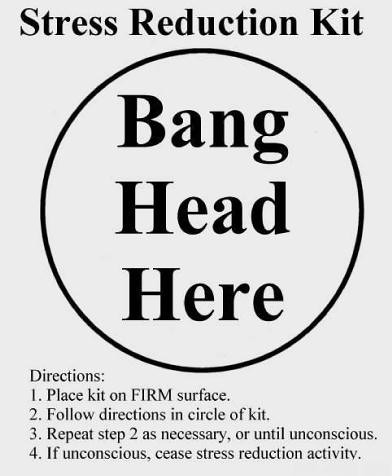Surviving and Thriving in the Face of Failure – Post #2

Some ways to deal with stress are not as effective as others
In an effort to help service people cope with negative emotions connected with failure and other difficult experiences, the U.S. Army is providing resiliency training to soldiers and drill sergeants. The goals are to reduce the number of Army service people suffering from post-traumatic stress disorder (PTSD) and to actually increase the number who can grow after experiencing PTSD.
I find it interesting that growth, not merely recovery, is one of the goals. While enduring the trauma of war and losing one’s company (as Steve Jobs did at Apple) clearly are not the same thing, it’s interesting that the U.S. Army is trying to help service members to view difficult experiences as catalysts for improved performance.
The Army’s effort is described in the article “Building Resilience” by Martin E. P. Seligman, which appeared in the April 2011 issue of Harvard Business Review. Seligman is the Zellerbach Family Professor of Psychology and director of the Positive Psychology Center at the University of Pennsylvania. He also is the author of the book Flourish: A Visionary New Understanding of Happiness and Well-being (Free Press, 2011).
In a nutshell, Seligman writes, “Thirty years of research suggests that resilience can be measured and taught—and the U.S. Army is putting that idea to the test with a program called Comprehensive Soldier Fitness. The aim of CSF is to make soldiers as fit psychologically as they are physically. A key component of CSF is ‘master resilience training’ for drill sergeants—a form of management training that teaches leaders how to embrace resilience and then pass it on, by building mental toughness, signature strengths (such as curiosity, bravery, persistence, integrity, fairness, leadership and self-regulation), and strong relationships.”
A series of specific courses have been developed to help soldiers and sergeants amplify positive emotions, recognize when negative emotions are out of proportion to the threat and to build a variety of relationship skills—including fostering trust, constructively managing conflict, creating shared meaning, and recovering from betrayal.
There’s even a program on “spiritual fitness,” which takes soldiers through the process of building a “spiritual core” with self-awareness, a sense of urgency, self-regulation, self-motivation and social awareness. According to Seigman, “’Spiritual’ in CSF refers not to religion but to belonging to and serving something larger than self.”
There’s much more to the Army CSF program, but these courses alone appear to be a pretty good “starter list” for any organization interested in designing a resiliency training and development module for leaders and employees.
Next post: How losing a client led to increased personal and business resilience at Intertech.